Father Bob has talked about how well we were fed when were in the Lui compound – and we were! There was always more food than the five of us could or would eat. It always bothered me to realize how luxuriously we were being fed, especially recognizing how our abundance compared to our hosts’ scarcity. The one thing he didn’t mention – but which I think we all realized – was that when we had those meals in the compound, we were aware that any of our leftovers would go back to the Lui folks to feed their families. Personally, at every meal, that motivated me into a mind-set of “how little can I eat?” rather than “how much do I need?”
Things were somewhat different when we visited the outlying villages. Here, even before I begin my narrative, I am mindful of Deborah’s counsel. When you travel around Lui, you tend to think your experience is normative. If you observe something, you think that’s how it always is. As she said, it’s like the oft-cited story of the blind men touching the elephant; each one thinks his perception is The Whole Truth. So I preface my remarks with the recognition that other people have had and will have different perceptions and different realities.
This was a constant in my experience in the outlying villages. Each time we arrived in a village, we were ushered into a tukel, and the local people washed our hands. Hearing about this custom before our trip, I thought “How quaint!” But it’s not merely quaint and it’s not merely symbolic. If you travel from one village to another, you are hot and sweaty and filthy! It’s dry and dusty, and you’re covered with dirt and sweat. You might not “need” your hands washed, but you sure do wish for a chance to have them washed!
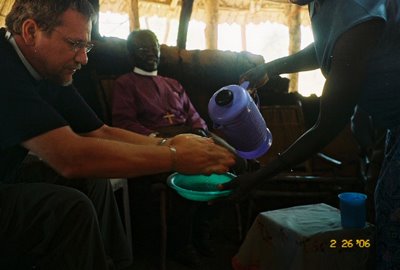 Here, Archdeacon Robert is getting his hands washed in the village of Kedibah. Bishop Bullen is looking-on in the background.
Here, Archdeacon Robert is getting his hands washed in the village of Kedibah. Bishop Bullen is looking-on in the background.It didn’t take very long to connect this experience to the New Testament stories of Jesus – of how he arrived in a village, and a woman washed his feet with perfume, and of the Maundy Thursday story of his washing the disciples’ feet. Suddenly, those stories sprang to life. They were not “symbols” of anything when those events took place. They were just dirty, practical reality.
On our trip, sometimes we had time to have a meal with the local people when we arrived in a village. Other times, we were running so far behind schedule that we had to get to church quickly and have a meal afterwards.
In either case, the drill was pretty much the same.
People would wash our hands. Then people (usually women) would bring the food into the tukel. Some people had the experience of seeing them coming into the tukel on their knees. I did not have that experience. Usually the people who brought the food were those (usually women) who had cooked the food. Then they would offer the blessing. Every time I saw this ritual, the people who delivered the food and prayed the blessing did so on their knees – while the rest of us (the Bishop and his staff of Lui clergy, as well as those of us visiting) sat in our comfortable chairs. It was a humbling moment. Then they would remove the covers from the food.
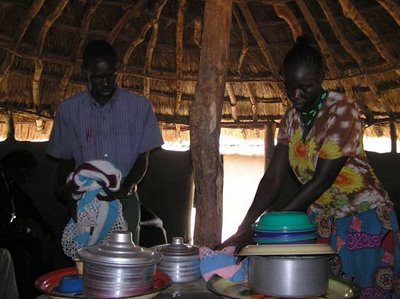
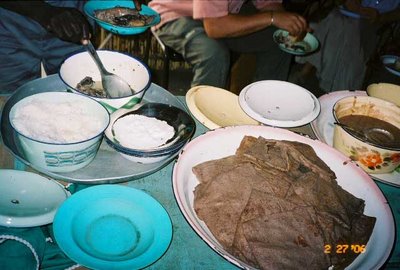
This is a typical “spread” in the villages. There’s rice (at the extreme left) and beans (at the extreme right). In the foreground is the sorghum-based bread that Father Bob has written about. This village was fairly close to a river, so they also provided fish (in the bowl at the upper left). In some of the villages, they also offered chicken or “meat.” Child of the beef industry that I am, I somehow thought that “meat” meant “beef.” It was only after I got home – and realized I had not seen a cow in those 12 days – that I realized “meat” translates to “goat” in Lui. I ate plenty of “meat” in Lui – and enjoyed it!
Father Bob has written about the wonderful wheat bread we often had in Lui and mentioned the sorghum-based bread we often had in the villages. He spoke of the fact that these were “rare treats.” I did not understand why they were such rare treats until I began to grasp the labor involved in making this bread. Start with this: The women in Lui can’t just run out to Schnuck’s and pick up a pound of flour. They must grow or procure the grain. Then they must grind the grain into flour.
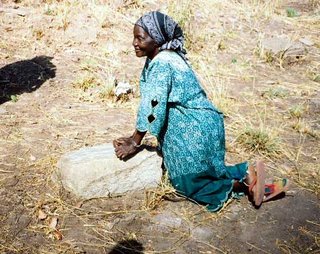 I am told that it takes a women – on average – at least 4 hours a day to grind enough grain for her extended family to eat for a day. Four (or more) hours a day! Furthermore, I am told that grinding mills exist which could reduce that 4 or more hours to less than 1 hour per day – and that the Bishop wants to get those mills into Lui so that the women will have time to attend literacy classes. How can we not provide those grinding mills?!?!
I am told that it takes a women – on average – at least 4 hours a day to grind enough grain for her extended family to eat for a day. Four (or more) hours a day! Furthermore, I am told that grinding mills exist which could reduce that 4 or more hours to less than 1 hour per day – and that the Bishop wants to get those mills into Lui so that the women will have time to attend literacy classes. How can we not provide those grinding mills?!?!OK. I need to say this as one who is very fastidious about using napkins and cutlery. For me, the most difficult adjustment about eating in Lui’s villages was getting used to eating without either of those things. No fork. No knife. No spoon. No napkin. [Fortunately, in the Lui compound, we did have spoons. But not in the other villages.] I had heard that one would eat with one’s hands. Having grown up eating barbeque and fried chicken by hand, that didn’t catch my attention. Then I got into the remote villages of Lui, where you’re eating beans and rice with your hands.
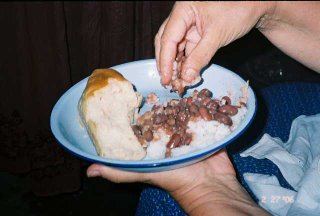 This was a very different experience. I was surprised that this was such a difficult adjustment for me. Reflecting on it afterwards, I got some perspective on why I had had such a visceral reaction against eating with my hands. In the U.S., from our earliest infancy, we are taught that eating with utensils is a sign of being a “big girl” or “big boy.” To revert back to eating with our God-given “utensils” [i.e., our hands] was a very jarring experience for me. (By the way, after the first day of having that experience, I took a bandana with me on the subsequent trips, and was able to use it – to my great relief.)
This was a very different experience. I was surprised that this was such a difficult adjustment for me. Reflecting on it afterwards, I got some perspective on why I had had such a visceral reaction against eating with my hands. In the U.S., from our earliest infancy, we are taught that eating with utensils is a sign of being a “big girl” or “big boy.” To revert back to eating with our God-given “utensils” [i.e., our hands] was a very jarring experience for me. (By the way, after the first day of having that experience, I took a bandana with me on the subsequent trips, and was able to use it – to my great relief.)There was a second hand-washing ritual in the villages I visited. After everyone had eaten, one of the local folks would again make the rounds with her water pitcher so that everyone could wash their hands.





No comments:
Post a Comment